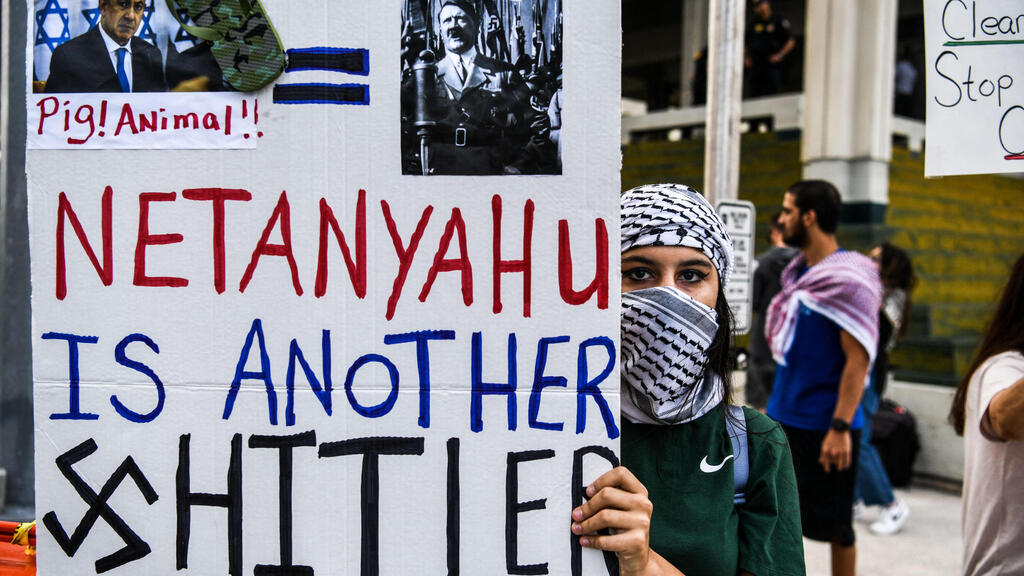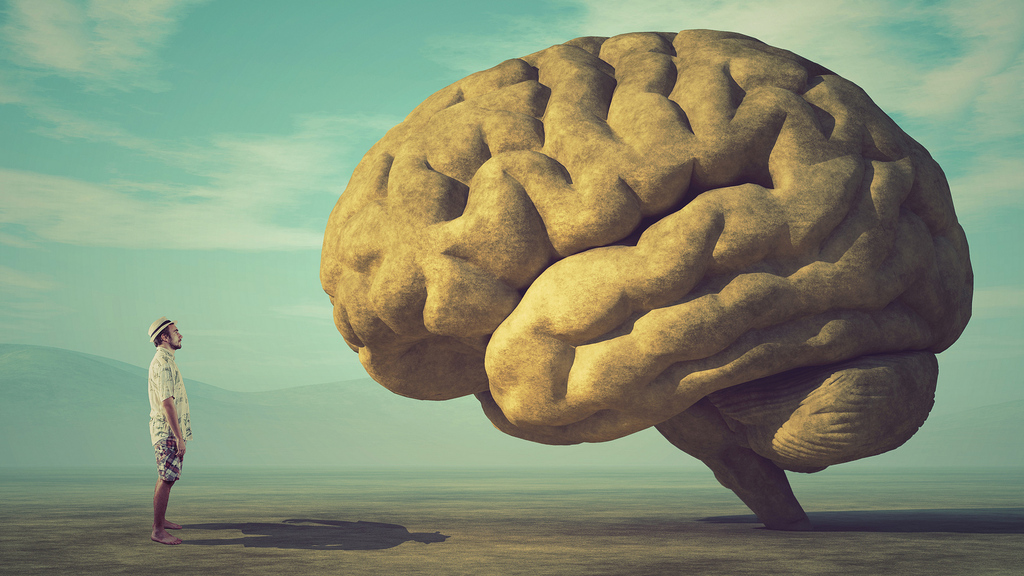When looking at the Israeli-Palestinian conflict, we see two sides entrenched, driven by fear and hatred. What we take for granted is that we are the ones doing the looking.
Research in cognitive neuroscience and psychology is increasingly aware of the power of cognitive biases shaping our perception of reality. While politicians and extremists are often responsible for fueling discord, every person is somewhat guilty of falling into narrow patterns of discourse and rigid views.
6 View gallery


A woman in Florida holding a banner which calls Netanyahu 'Hitler' during a pro-Palestinian rally
(Photo: AFP)
Being mentally entrenched, people and governments alike feel there is very little that can be done to resolve this century-long conflict - most have given up altogether. But problems can get easier when looked at from a different angle. Before we ask ourselves what we can do about the Israeli-Palestinian conflict, we should turn our attention to how we think about the conflict.
That leads us to the supposedly-harmless grey blob between our ears.
One of the brain’s functions is to construct a model of the world in order to help the body navigate it. An optimal model must balance (a) sensitivity to differences between objects or situations with (b) generalization across categories and contexts.
In Machine Learning, this is called the bias-variance trade-off. Human cognition routinely faces the similar choice between using simple heuristics (a mental shortcut that allows people to solve problems quickly) or relying on complex models for perception and decision-making.
However, every organ and organism would rather be lazy and conserve energy. So long as it can afford it, the brain will favor the simplest model possible: as Daniel Kahneman suggests, heuristics are usually cognitively “cheap”, while complex models are demanding, thus effortful and energy-consuming.
There are a number of heuristics that allow the brain to produce a simple and economical model out of a complex and dynamic reality. However, ‘simple and economical’ is not always ideal, and sometimes it can be destructive. How do such cognitive biases affect our approach to the Israeli-Palestinian conflict? We will focus on three.
Dichotomous thinking
The cognitive bias called dichotomous thinking refers to our tendency to think in binary terms: dividing the world into two mutually exclusive and opposing groups. This tendency allows the brain to maintain the simplest model possible, and one that will not be perturbed by small changes in circumstance.
When dealing with one of the most complicated conflicts of the modern era, this clever cognitive trick is problematic, if not pernicious. As the name itself suggests, the Israeli-Palestinian conflict is framed by gross divisions and categories. We are tempted to summarize it as a problem between “Israelis” and “Palestinians”.
To preserve our dichotomous model, we’ll align other categories with our two primary ones, such as “Jews” with “Israelis” and “Arabs” with “Palestinians”, or the “right side” versus the “wrong side”. This also makes us distrust categories that violate our dichotomy, like “Arab Israelis”. For our own literal peace of mind, we demand that these Israeli citizens of Palestinian ethnicity pick a side and abandon any dual loyalty.
6 View gallery


An Israeli flag being waved in front of a crowd of pro-Palestinian protesters
(Photo: AFP)
The truth is, the Israeli-Palestinian conflict involves dozens of ethnic and cultural identities, like secular Jews, religious Zionists, Ultra-Orthodox, Bedouins, Christian Arabs, Muslim Arabs, liberals and conservatives, radicals and moderates, Gaza citizens and West Bank citizens, to name a few. There are three governments in place, hundreds of politicians, leaders and political parties, terrorist organizations and radical movements, and that is only within Israel-Palestine. What about regional powers, global superpowers, and international organizations and movements?
Any division we make will lead to a different view of the conflict - the reasons for it, the problematic factors, and the possible solutions. What insights would offer themselves if the line were instead drawn between moderates and extremists, or between citizens and leaderships?
In any case, a dichotomous division is bound to be too crude. Questions like “are you pro-Israel or pro-Palestine?” and statements like “Israelis started” or “Palestinians are to blame” already assume a dichotomy that in many ways is arbitrary.
Internal attribution of behavior
Speaking of blame, another cognitive bias we have is internal attribution, better known as the fundamental attribution error. This refers to the cognitive tendency to over-emphasize dispositional or personality-based explanations of a person’s behavior, and under-emphasize situational and circumstantial explanations. In other words, we tend to treat a person’s action as a reflection of who they are. This makes things simpler for the brain: if that person did something because of who they are, there is no need to take into account the complex and constantly changing circumstances; we will try to explain and predict how they act at any time based on their identity, regardless of the situation.
Accordingly, a Palestinian would commit a terrorist attack because she is Palestinian, regardless of socio-economic conditions or the occupation of Palestinian territories – wanting to harm Israelis is who she is.
Meanwhile, Israelis would occupy the Palestinian territories because they are Israelis, regardless of terrorism or political pressures. Since Palestinians and Israelis act based on their identity, and their identity is unlikely to change, they will always act the way they do. Notice how this view is coupled with dichotomous thinking: because there are only two identities that matter – Palestinian and Israeli, their being Palestinian or Israeli is what explains their behavior.
With such a perspective, how can peace be achieved and how can peace achieve anything? This is one of the reasons so many Israelis are terrified of the two-state solution. Granting the Palestinians a state and independence would only give them more power to try and destroy Israel. This fear completely ignores how such a drastic change in Palestinians’ circumstances could somehow change their behavior towards Israel – after all, they’ll still be Palestinians.
Internal attribution bias prevents those involved in the conflict (no matter where they are on the planet) from taking responsibility. By pinning the behavior of a group on their identity, we fail to consider how our own actions could trigger or maintain that behavior. We remove ourselves from the equation and blame the devastating outcomes of the conflict on others.
6 View gallery


Israeli settlers in the West Bank throw rocks at Palestinian houses
(Photo: Yesh Din)
The dynamics between individuals and groups play an important role in how each of them behaves. Instead of waiting for the others to act right before we show compassion and compromise, we ought to ask ourselves, how do my actions affect them? How can my self-improvement impact the goals, ideology, and actions of the other side?
Status quo bias
While there are many other cognitive biases likely to be affecting our approach to the Israeli-Palestinian conflict, we might briefly refer to a third and central tendency -maintaining the status quo.
This bias refers to our preference for the current state of affairs and resistance to change. This is true of behavior as well as belief. Change means uncertainty, adaptation, and trade-offs. If things are just bearable enough, if our views are just right enough, why change anything? As a result, we are reluctant to modify our beliefs about the conflict, hear opinions that threaten them, and consider new possibilities.
The internal conflict of our mind
Readers might get the impression that if our perception is shaped by these cognitive biases, then there is nothing we can do to change our views on social and political matters. These biases might seem an imperative we cannot escape, but it is better to treat them as a habit. Though most of us acknowledge the complexity of the Israeli-Palestinian conflict and the weight of circumstance, our thoughts and conversations all too often slide back to these heuristics favored by our brain.
In our daily internal dialogues, we often oppose bad habits, such as skipping the gym, with rational responses. The same happens when we are tempted to judge someone while another part of us reminds us not to rush to conclusions.
This dialogue can happen between our cognitive biases about the conflict and our mindful understanding. The same is true of external dialogue - we should seek out more information from more angles and constantly discuss among us, doing so with an explicit awareness of our cognitive tendencies.
Above all, our education, whether at school, at home, or on our social networks, should train our minds to develop better habits of thought. Like our bodies, disciplining our brain can reduce its laziness. We ought to teach younger generations to doubt not only the answers, but the questions as well; not just to consider each side in a discussion, but to consider how the discussion is framed.
Our brain shapes the way we view the world, and therefore how we choose to act in it. Cognitive biases like dichotomous thinking, internal attribution, and the status-quo bias have a fundamental role in how we think – and talk – about the Israeli-Palestinian conflict. Once we have freed ourselves from narrow habits of thought, there is every bit of hope that we will find solutions, common ground, and initiative. More importantly, there is hope that twelve million individuals from the river to the sea, however grouped and classified, will know peace and prosperity.




